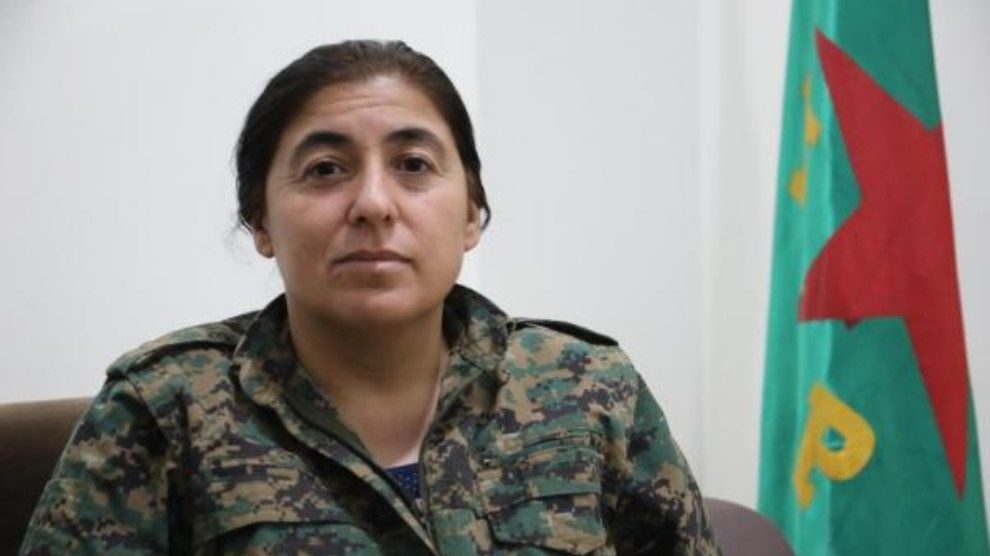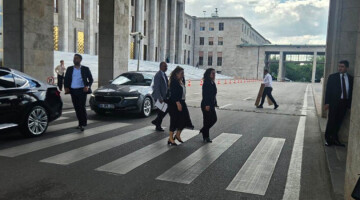The Turkish state continues to threaten Northern and Eastern Syria as they insist on the 32 km deep “safe zone” which will effectively depopulate the area where peoples live in harmony and safety.
The Autonomous Administration of North and East Syria has put forth conditions for any possible “safe zone”, namely, that it can be a maximum of 5 km deep, towns and residential areas cannot be included and the area cannot be under Turkish state control. The autonomous administration said International Coalition forces and Turkey’s forces can participate in the patrols, but the patrols can be in open land, not in towns. These have been submitted to relevant authorities and the administration lastly stipulated that the forcibly displaced residents of Afrin be able to return home.
TOWNS ALONG THE “SAFE ZONE” BORDER
There are Kurds, Arabs, Syriacs, Armenians, Yazidis, Turkmens, Circassians and Chechens living in the Northern and Eastern Syria region. Several towns under the Autonomous Administration, Deriq, Tirbespiye, Qamishlo, Amude, Serekaniye, Dirbesiye, Gire Spi, Kobane and Manbij, are within the disputed “safe zone”.
TURKISH STATE VIOLATIONS AT THE BORDER SINCE 2011
Turkish state’s insistence on a “safe zone” along the Northern and Eastern Syrian border has brought about one question: Who needs this safe zone? According to the Cizire Human Rights Association, the Turkish state has committed many rights violations along the border between Northern Kurdistan and North-eastern Syria since 2011, not counting the violations in Afrin:
223 people have been killed. 3 people had their organs harvested. Dozens of women have been raped and abducted. 332 people were injured and at least 15 tortured. Turkish soldiers have barred farmers in 129 villagers to work on their fields or even approach their lands. The lands that haven’t been cultivated due to the soldiers come to a total of 27,633 decares.
SDF General Command Member Newroz Ehmed spoke to the ANHA about the Turkish military activity along the Northern and Eastern Syrian border and the threat against the region.
How did the “safe zone” discussions start?
We didn’t have a “safe zone” on our agenda in any way, shape or form. Because our territory is already safe. But as ISIS approached defeat, certain forces sought to control the area. These plans have failed. We had been in contact with neighboring countries like Turkey. There were talks, albeit not official. The Turkish state knows very well that there have never been any attacks to their territory from our side. We have never engaged in any efforts to endanger Turkish state politics. But recently, their threats have increased. They think the Kurds achieved a status in Southern Kurdistan, now they will do so here, and they cannot allow such a thing to happen along their border. That is their only motivation. That is why they threaten and want to attack.
“THE SAFE ZONE ENTERED OUR AGENDA WITH THREATS”
We have no intention to attack the Turkish state. We are already busy dealing with attacks against our people within our territory. But the Turkish state keeps saying they don’t want such a force at their border. The safe zone idea entered our agenda through threats. We say as the peoples of the region and the defense forces that our region is the safest. Our people live in peace, freely exercising their identities and faiths. There are great numbers of migrants living in Northern and Eastern Syria today.
What does the Turkish state want to do with the safe zone?
We say this clearly: We do not want war to continue on our lands. We can resolve the issues the Turkish state poses as excuses for war through dialogue. The Turkish state invaded another country’s territory in front of the whole world to see. What happened in Bab, Jarablus, Azaz, Idlib and Afrin is clear. Now they
wish to invade Northern and Eastern Syrian territory with the same excuses. Our region is already safe. But, we are open to discuss the safe zone they wish for. Because we do not want to subject our people to another war. We want to reach an understanding with these forces, as much as that is possible. We want an outcome that our people would like and the Turkish state’s reasons would be satisfied.
“IT IS NOT POSSIBLE FOR THE TURKISH STATE TO BE IN THE REGION”
We can form border security forces and guarantee that there will be no attacks from our side. But the Turkish state doesn’t want the peoples of the region defending themselves. And we don’t accept a foreign force for defense. Everybody must know that the Turkish state’s desire to be present in the region is not acceptable. Because the Turkish state invades wherever they go, and they settle. So many of our people have been killed at the border. It is not possible for the people of the region to accept this.
What do they plan for with the 32 km depth?
The Turkish state has been planning with certain forces and the Syrian regime to impose the 32 km. That plan gives control of a 32 km deep area to the Turkish state. There will be other forces in southern Syria too. This way they want to divvy up the region among themselves and destroy the values created by a great price paid. This is what creates the big threat and expose the Turkish state’s true intentions.
Is there a connection between ISIS attacks against the region and the Turkish state’s threats?
Whenever the Turkish state threatens us, ISIS intensifies their attacks in the region. The attacks have increased significantly in this most recent period, which shows that the Turkish state wants to revive ISIS and control the region through them, or if that fails, just create chaos. In this recent process, ISIS has clearly stated that the organization will re-emerge from the camps where ISIS families stay. Sleeper cells captured by our intelligence units say they will ‘have their vengeance’, return to the region, and so on. That is a grave threat. The revival of ISIS is a threat against humanity, not just the region. Yes, we can keep ISIS members in prisons up to a point, but this is putting a strain on us. International courts must be established for these gangs.
The SDF Command recently met with US CENTCOM General Kennet McKenzie and Special Envoy for the International Coalition William Roebuck. What level were these meetings with US representatives at? Did they produce results?
We met with the US officials about the Turkish state threats, our conditions for a “safe zone”, our insistence on dialogue for a solution and the ISIS sleeper cells. They were in favor of reaching a solution without another war in the region. Turkish state threats are blocking the solution. These most recent meetings haven’t produced concrete results, not as such, but the process and our meetings continue.
Of course we want results too. But the outcome must satisfy our people. The approach of Northern and Eastern Syria’s peoples is commendable and it gives us great morale. The people know that it is not just the Kurds in the crosshairs, that the goal is to tear down the growing project of coexistence in the region.
We have achieved gains through difficult processes and support from our people. We will, in turn, protect our people. Our people know they cannot live anywhere else but on their own lands. If the Turkish state attacks, we will wage a strong war to defend our people. We are open to dialogue and we want to support efforts for a solution, but if necessary, we will put forth a great resistance anywhere.
In the media the Turkish state constantly talks about the return of Syrian refugees. Before the invasion of Afrin, this matter was posed as an excuse for the occupation. Why are they talking about this?
The Turkish state is using the Syrian refugees as an excuse to legitimize their occupation in the public eye. But the people of the region haven’t migrated to Turkey, they live on their own lands. The ones who fled to Turkey were
a small number of ISIS-connected persons who were backed by the Turkish state. When we liberated Gire Spi, some small groups under the Free Syrian Army (FSA) fled. The Turkish state uses the migrants as an excuse to say the people of the region moved away to Turkey and they will send them back home. They are looking for a base for their attacks, and when they find it they want to launch an extensive attack. They want to legitimize their excuse for the invasion, really. But that is not possible.
What will your strategy be in case of an attack?
“ATTACKS WILL CHANGE THE BALANCE IN THE REGION”
If the Turkish state isn’t willing to reach a solution and pushes for war, they should know that we are ready for war. In case of an attack against there region, the war will not be limited to the area that was attacked. The Turkish state wants to invade the whole region bit by bit as they started in Afrin. But a war they launch will not be limited to one area. We have a long border with the Turkish state. If there is a war, all of the border will be a war zone. Of course war is a great threat against the people. There are millions of civilians from all ethnicities in the region in question. And a war would change the balance in the region completely. There are other forces in Syria. The Syrian regime will attempt to take the whole territory under control again. There are Iranian forces and gang groups in the region. ISIS in particular poses a threat to our territory. If there is another war, ISIS would take advantage of it and they will come back. It must also be known that there are thousands of migrants in camps, and their lives will be at risk too. There are also ISIS prisoners, especially those arrested in the Deir ez-Zor operation. If Turkey attacks, these gang members will likely escape and reorganize.
Are there talks with the Syrian regime against the Turkish state threats?
We have had meetings with the Syrian regime in the past, but the regime wants to go back like nothing ever happened, and impose their own conditions. The regime wants to make us out to look like we betrayed the Syrian land and allowed foreign forces on Syrian territory. Like we are partners with foreign forces. That is not the case. The Syrian regime knows very well that we did not bring anybody here, the partnerships that developed were a result of the events in the region.
Foreign forces entered Syrian territories because of the very mindset of the Syrian regime. Sometimes they voice their attitude against Turkish state invasions, but really they share the same ideas about the peoples. We insist on dialogue to change the denialist and eliminationist minds. The attacks are dangerous for the Syrian regime too. In the end, it is Syrian territory that is being occupied. If turkey attacks, then it won’t be possible to later sit down together and resolve it among themselves. The situation will turn much worse and more complicated. In short, yes we have had meetings with the Syrian regime occasionally, but we have regrettably not been able to reach a result.
RELATED NEWS:














